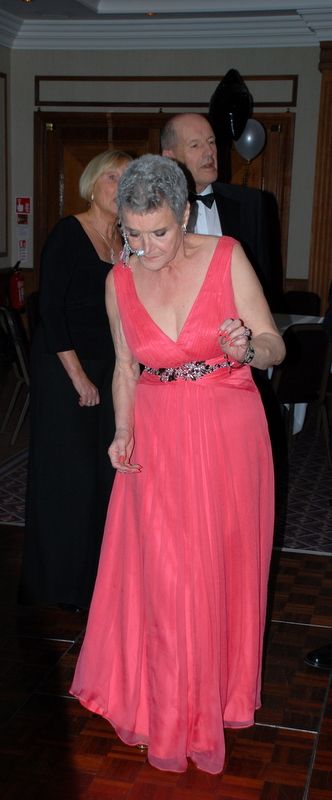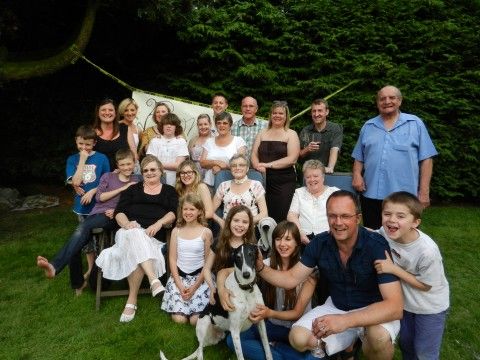Daughter of oesophageal cancer patient backs QEHB Charity research

(Janet Walters at her Carpe Diem party, pictured with close friend Di) The daughter of a cancer patient is backing research into oesophageal cancer, funded by the Queen Elizabeth Hospital Birmingham (QEHB) Charity. Alison Deere, a 44 year old mother of two, lost her mother, Janet Walters, to this type of cancer in December 2012. The fun-loving 70 year old and devoted grandmother of six was diagnosed with oesophageal cancer in the spring of 2011, and died just over one year later. Alison, who lives in Oldbury with her husband of 13 years, Kevin, and their two children, Matthew and James, struggled with the loss of her mother and the experience of caring for someone with this type of cancer. She said: “My two sisters, Sarah and Jacqui, and I miss my mum terribly. She was headstrong and fabulous until the day she died. “Following her initial diagnosis, mum was offered surgery to remove the cancerous part of her oesophagus there and then. Devastatingly though, the cancer was right next to her voice box which meant surgery would have left her without the ability to speak or eat again. She thought, ‘what kind of life would that be?’” Instead of surgery, Janet opted for chemotherapy, which she endured for the remainder of the year. Alison explained: “Mum was a real talker. Since the death of my father in 2013, her husband of nearly 40 years, Mum transformed herself. She enjoyed the gym and loved becoming a bit of a glamour puss, often getting her nails done. We all hoped for a positive end but right from that first diagnosis we were told by doctors that they couldn’t guarantee it. She couldn’t have given up her independence like that – not being able to talk or feed herself, so chemotherapy was her only real option.”

Sadly, in January 2012, Janet received news that the chemotherapy hadn’t worked. “That February we threw a huge party. Mum was the star of the show, with everyone dressed in black or white apart from her. She was upset that her feeding tube couldn’t be removed before her party, so we ‘blinged’ it up! She wore a pink dress and didn’t stop dancing all night! She looked fantastic and seemed so happy to be surrounded by friends and family. That’s a great memory to have of her,” said Alison. Sadly, following the terminal diagnosis, Janet quickly began experiencing difficulty breathing. Surgeons carried out an operation called a ‘tracheostomy’, which involved creating a hole in Janet’s throat from which to breathe. Janet was left unable to speak and completely reliant on a feed tube, as well as the help and care of family members to carry out everyday tasks. “Mum’s illness was honestly one of the worst things I’ve ever experienced. Sometimes the feed tube would leak and other times the hole in her throat would drip with fluids. There is nothing about this cancer that can be hidden. She lived with it for everyone to see, and that was hard for her.” Ten days after celebrating her 70th birthday with friends and family, Janet passed away in a hospice on 19 December 2012. Now Alison wants to help raise awareness of oesophageal cancer and raise money to fund research into the disease, which will take place at the Queen Elizabeth Hospital in Birmingham. Olga Tucker, Consultant Surgeon in Upper GI Surgery at the QE, is conducting research to enable earlier detection of oesophageal cancer in patients, therefore increasing the likelihood of survival. She said: “Oesophageal cancer claims the lives of almost 8,000 people in the UK every year with survival rates of only one in ten. “The oesophagus is the muscular tube that carries food from the mouth to the stomach. Some people experience changes in the inner lining of the oesophagus, which is called ‘Barrett’s Oesophagus’. “This is a pre-cancerous condition which requires close monitoring to detect cancer of the oesophagus in its early stages. “With support from QEHB Charity, our project aims to identify those patients with Barrett’s Oesophagus who are at high risk of developing cancer so that this group can be monitored more closely to detect cell change and cancer at an earlier treatable stage. In addition, those at a lower risk could be reassured and spared regular long term camera tests which are intensive and invasive follow up investigations. We also aim to investigate the function of genes which may identify a target for drug therapy in the future.”

Alison said: “Mum’s illness and my family’s experience of oesophageal cancer was harrowing. I don’t want any other family or person to go through it. My son, James, asked me if it was ok not to believe in God. When I asked him why, he told me he couldn’t understand why God wasn’t very nice to his Granny. “They saw too much, the whole experience was traumatic and dramatic for everyone involved. “This research will help thousands of people who are diagnosed with this messy and invasive form of cancer every year. I hope everyone familiarises themselves with this illness and gets behind this invaluable research at a world-class hospital.” For more information about how the QEHB Charity supports cancer patients, please visit www.qehb.org